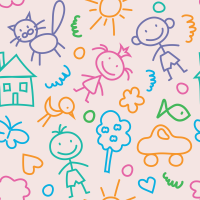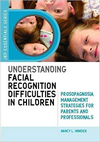
Most children and their parents are unaware of face blindness as a neurological condition. However since prosopagnosia often runs in families (though not always), more children are being identified as parents recognise behaviours that could indicate a lack of facial recognition.
“My life would be a different story if I had known at an earlier age.“
A diagnosis for a child (or adult) with face blindness can help them to start to make sense of the fact that most people recognise others so readily, while they find it such a challenge. It explains the frequent social blunders which can undermine the individual’s self confidence and self esteem. Without an explanation they may start to see themselves as stupid, lazy, inattentive etc or become increasingly isolated or stressed in social situations. So early diagnosis is important and can make a real difference.
Some Common Childhood Traits
Face recognition is an ability that develops through childhood, only reaching full maturity in mid-adolescence. However, if you notice your child failing to recognise familiar people, even family members, or approaching a complete stranger, mistaking them for someone else you might consider whether they could have a degree of face blindness.
A more detailed list is listed is given under Childhood Traits.
Prosopagnosia also appears to be more prevalent amongst children with autism, and perhaps with other neurodiversities, though this is still an area being researched. So even if your child has such a diagnosis you might want to consider whether face blindness might also be a contributing factor to any unusual ways of interacting with others.
An article written in 2023 in the American publication Autism Parenting Magazine explores the issue Is Face Blindness Linked to Autism?
Getting a Diagnosis
The majority of parents members of Face Blind UK have relied on their own observations to self-diagnose their child. Teachers, GPs and even Educational Psychologists still often have limited knowledge or experience of prosopagnosia. So it is often the parent who will inform the professionals of their child’s face blindness. Prosopagnosia can then be added by the GP to the child’s medical notes as a long term condition.
There are some university research programmes that will test for face blindness in children as part of their research projects. Bournemouth University has a programme of research looking at prosopagnosia in children.
What are the possible Social and Psychological Impacts?
Though there is much anecdotal evidence amongst individuals with prosopagnosia that indicates it can have a very significant impact on self-image, self-esteem and social behaviour and confidence, there has been very little research into this area.
An academic paper by Dalrymple (2008) A Room Full of Strangers looked at the psychosocial impact of prosopagnosia in childhood, on a group of children who had received a formal diagnosis.
A dissertation for an MA in Child Psychotherapy (2023), written by Hazel Plastow, brings together a wide range of reference materials related to The Psychosocial Impact of Prosopagnosia in Children. Download as a document to print out (coming soon)
However, recognition of the condition, the opportunity to talk about the challenges it presents, and exploring ways in which the impact can be reduced, can all contribute to supporting a child manage their expanding social circle as effectively and safely as possible.
What can help
Researchers have explored possible interventions, including training children in face recognition strategies, for example at Bournemouth University and Sterling University. However, while the computer-based training sessions have resulted in better recognition of the test materials, this intervention appears to be limited in terms of transferring this improvement into everyday encounters. So the search for an effective intervention continues.
Face Blind UK has a Factsheet: Information for Parents and Teachers which can help you explain the characteristics and implications of prosopagnosia in childhood to others.

An American book by Nancy Mindick (2011) Understanding Facial Recognition Difficulties in Children is filled with strategies for parents and for teachers to help children negotiate life in the classroom and in socialising with their friends.
Alison Shorer (2024) a teacher and psychology researcher has produced Guidance for Education Settings, based on interviews with parents and prosopagnosic adults who have recounted their childhood experience as part of a Face Blind UK project funded by , The document addresses Primary, Secondary and Higher Education, identifying the challenges, potential strategies and adjustments, to help teachers support students with face blindness, in each of these settings. Download as a document to print out (coming soon)
Getting extra support for a child with prosopagnosia will depend on sharing the diagnosis with others, however deciding whether or not to tell other people about a child’s face blindness can be a real dilemma – there are no right answers.
Keeping Children Safe
One of the key concerns amongst parents, that emerged from Dalrymple’s research A Room Full of Strangers, was that of keeping children safe from ‘strangers’ or from getting lost in a crowd.
In terms of safeguarding it can be crucial for an adult in charge of a child (on an outing for example), to be aware that the child with prosopagnosia may be unable to identify their teacher or classmates in a crowd, or could go off with a stranger (perhaps wearing a similar coat), mistaking the person for their teacher.
However shared knowledge of the child’s difficulty could make them vulnerable to teasing or bullying (the child with prosopagnosia may not be able to identify the perpetrators), or even make them more vulnerable to strangers if they are aware of the child’s face blindness.
Understanding the world of the Face blind Child
While a parent or teacher’s own observations, combined to talking to the child, will give the best insight into how an individual child with face blindness experiences the world, there are other resources which may help.
There are two novels which have a teenager with face blindness as the main character and explore the impact of prosopagnosia on their daily lives.

Holding Up the Universe
Jennifer Niven (2016)
A story of two teenagers, each with their own challenges and strategies, for navigating the social dynamics of daily life in an American High School.

The Colour of Bee Larkham’s Murder
Sarah J Harris (2018)
A murder mystery with the only witness a boy with face blindness, autism and synaesthesia.
In addition Face Blind UK holds occasional Zoom meetings for parents of children with prosopagnosia, enabling them to come together to share experiences, challenges, ideas and strategies. Please sign up as a Face Blind UK member if this might be of interest to you.
